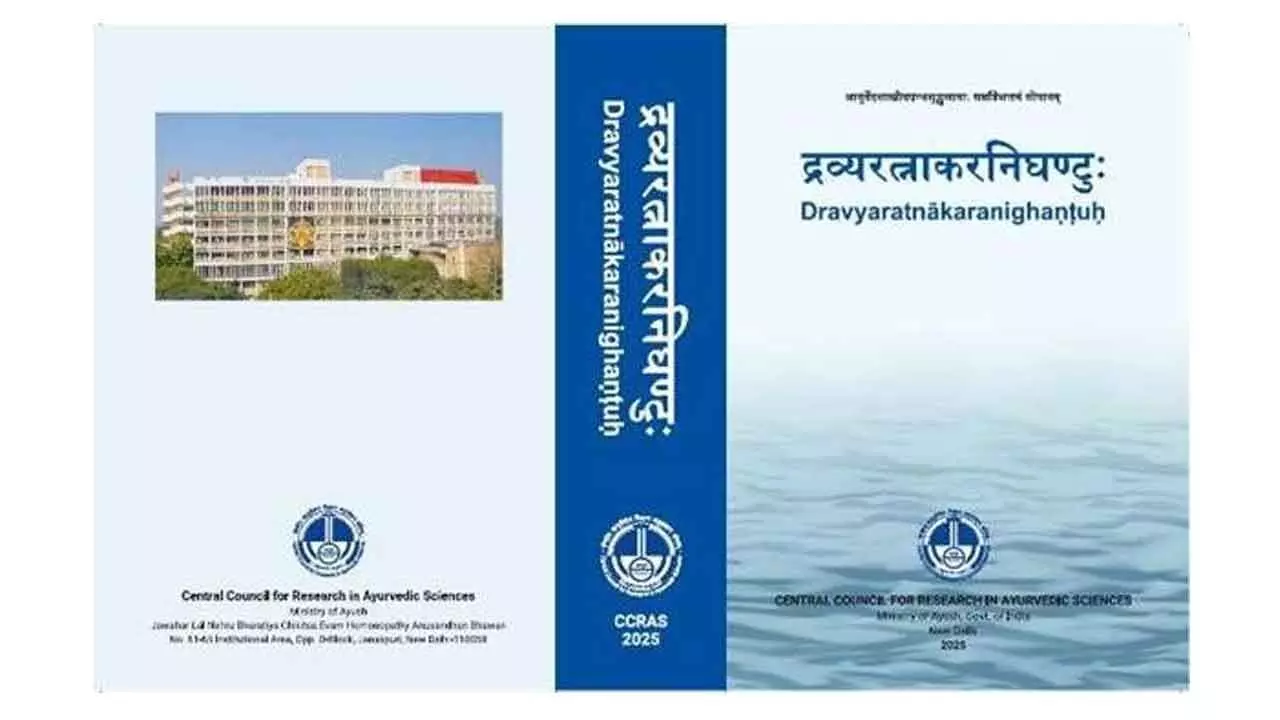CCRAS Brings Back Two Rare Ayurvedic Manuscripts
The revival of Dravyaratnākara Nighantu and Dravyanāmākara Nighantu marks a pivotal moment in the preservation and promotion of India’s classical medical heritage
CCRAS Brings Back Two Rare Ayurvedic Manuscripts

By breathing new life into these rare manuscripts, CCRAS not only safeguards traditional knowledge but also catalyses a renewed scholarly engagement with Ayurveda’s vast pharmacological legacy
Central Council for Research in Ayurvedic Sciences revives two rare Ayurvedic manuscripts: Dravyaratnākara Nighantu and Dravyanamākara Nighantu. These manuscripts will inspire scholarly exploration and deeper engagement with India’s classical medical literature
In a significant stride toward preserving India’s rich legacy in traditional medicine, the Central Council for Research in Ayurvedic Sciences (CCRAS), under the Ministry of Ayush, has revived two rare and significant Ayurvedic manuscripts—Dravyaratnākara Nighantu and Dravyanamākara Nighantu.
The publications are unveiled during an event organised by the RRAP Central Ayurveda Research Institute in Mumbai. The event was graced by Prof Vd Rabinarayan Acharya, Director General, CCRAS, New Delhi, who also delivered the keynote address highlighting the ‘Activities of CCRAS, Ministry of Ayush’, in research, digitisation, and revival of traditional Ayurvedic literature.
The manuscripts were critically edited and translated by renowned manuscriptologist and veteran Ayurveda expert, Dr Sadanand D Kamat of Mumbai. The release ceremony saw the presence of dignitaries, including Shri Ranjit Puranik, President, Ayurvidya Prasarak Mandal and Managing Director, Shri Dhootapeshwar Limited; Dr Ravi More, Principal, Ayurveda Mahavidyalaya, Sion; Dr Shyam Nabar and Dr Ashanand Sawant from Ayurvidya Prasarak Mandal; and Dr R Govind Reddy, Assistant Director (Ayu), CARI, Mumbai.
Speaking on the occasion, Prof Vd Rabinarayan Acharya emphasised the importance of such revivals in bridging India’s ancient wisdom with contemporary research frameworks. He said that “These texts are not just historical artefacts—they are living knowledge systems that can transform contemporary healthcare approaches when studied and applied thoughtfully”.
These critical editions are expected to serve as invaluable resources for students, researchers, academicians, and Ayurveda practitioners, further inspiring scholarly exploration and deeper engagement with India’s classical medical literature.
Dravyaratnākara Nighantu: Authored by Mudgala Pandita in 1480 AD, this previously unpublished lexicon consists of eighteen chapters offering in-depth knowledge on drug synonyms, therapeutic actions, and medicinal properties. A widely referenced text in Maharashtra until the 19th century, it draws from classical Nighantu us like Dhanvantari and Raja Nighantu while documenting numerous novel medicinal substances from plant, mineral, and animal origins. This critical edition, revived by Dr SD Kamat, is a monumental contribution to Dravyaguna and allied Ayurvedic disciplines.
Dravyanamākara Nighantu: Attributed to Bhisma Vaidya, this unique work serves as a standalone appendix to the Dhanvantari Nighantu, focusing exclusively on homonyms of drug and plant names—a complex area of study vital to Ayurveda. Encompassing 182 verses and two colophon verses, the text has been meticulously edited and commented upon by Dr Kamat, enhancing its utility for scholars of Rasashastra, Bhaishajya Kalpana, and classical Ayurvedic pharmacology.
Dr Kamat, known for his authoritative work on Saraswati Nighantu, Bhāvaprakāsha Nighantu, and Dhanvantari Nighantu, once again brings his deep scholarship and commitment to preserving India's Ayurvedic heritage. Dravyanāmākara Nighantu—an erudite supplement to Dhanvantari Nighantu, exploring Ayurvedic homonyms with precision
These critical editions are more than scholarly achievements; they are beacons for future Ayurvedic practitioners, researchers, and educators.

